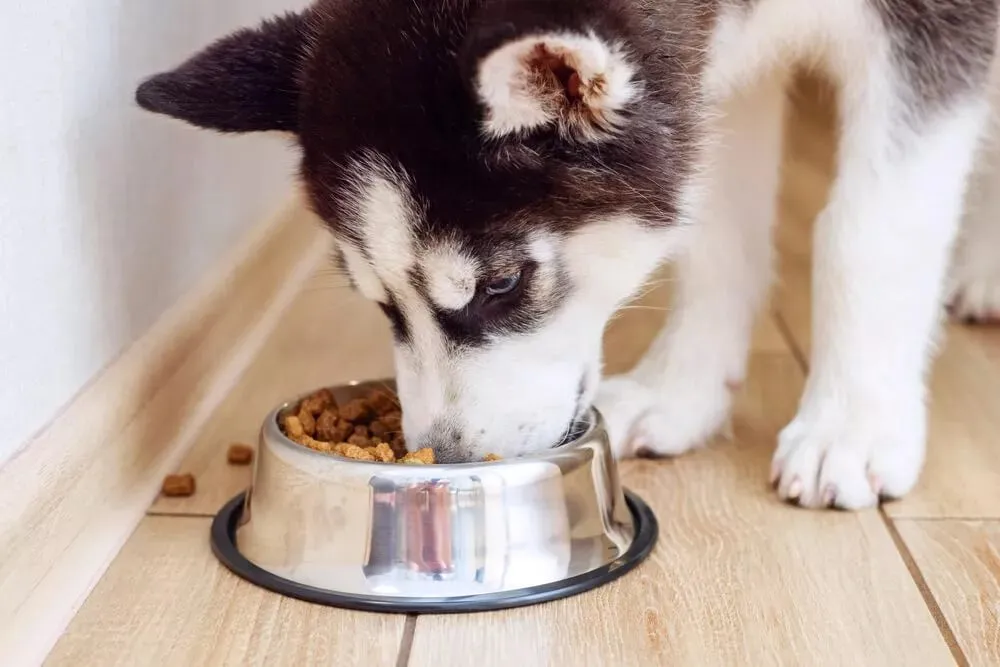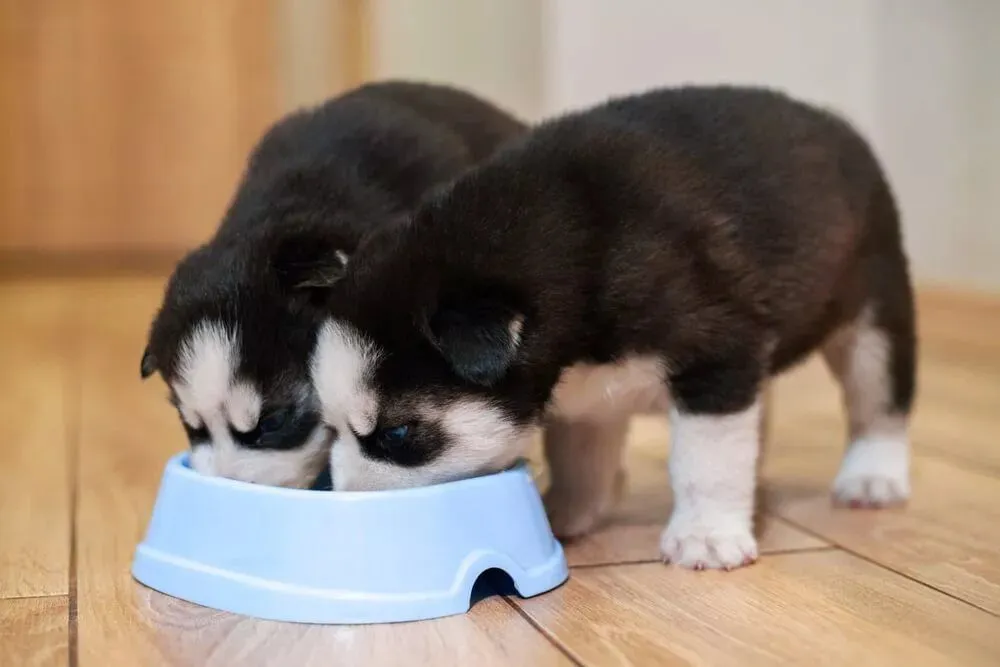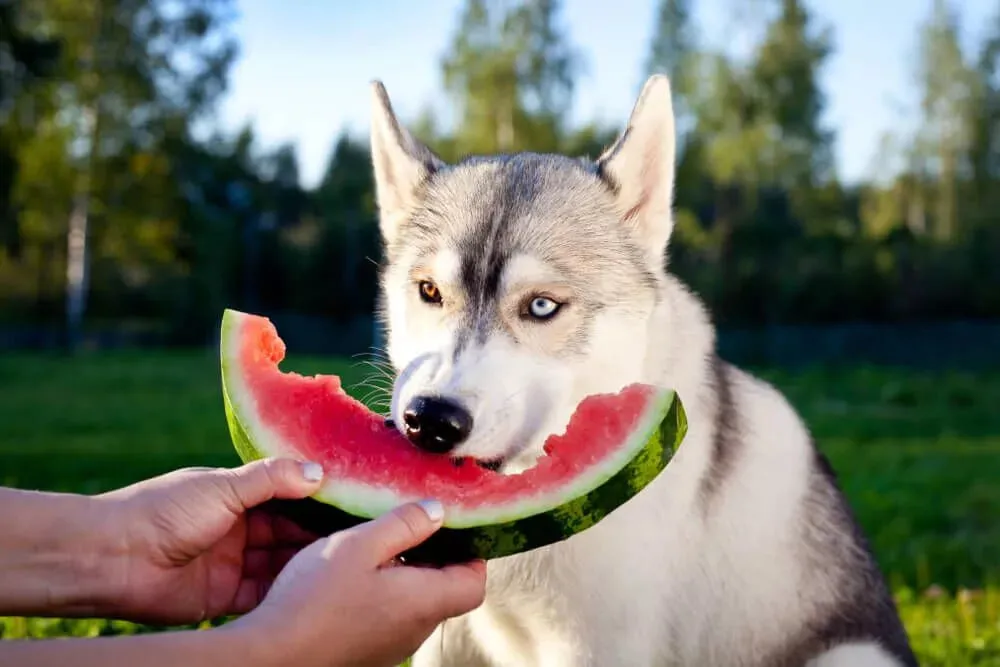Siberian Huskies are celebrated for their intelligence, playful nature, and adventurous spirit. Renowned for their strength, speed, and incredible stamina, these magnificent dogs require a well-balanced diet to sustain their high energy levels and maintain their overall health. Understanding What Type Of Food Do Husky Dogs Eat is crucial for any owner, ensuring they receive the proper nutrition to thrive. This guide will delve into the essential dietary needs of Huskies, the best food choices, and what should be avoided, exploring both their ancestral eating habits and the requirements of a modern family pet. Just like humans, dogs can sometimes enjoy certain human foods in moderation, and understanding what human food can you give a puppy can be a good starting point for owners exploring treat options.
What Did Wild Siberian Huskies Eat?
Huskies trace their origins to Siberia, where the indigenous Chukchi people relied on them for pulling sleighs and guarding their settlements. As one of the oldest dog breeds, domesticated over 4,000 years ago, Huskies have long coexisted with humans. In the wild, however, they were opportunistic feeders, consuming whatever was available, from scraps and discarded food to hunting live prey. Their strong prey drive meant they would hunt, kill, and eat small wildlife like rodents and rabbits. Additionally, they would forage for vegetation and wild fruits, and even consume the stomach contents of herbivores to incorporate fiber and variety into their diet. It’s important to note that the dietary needs of Huskies living as family pets differ significantly from those in the harsh, cold climates of Siberia or Antarctica, as companion dogs are typically less active and require fewer calories for warmth.
 A majestic Siberian Husky running gracefully through a snow-covered landscape.
A majestic Siberian Husky running gracefully through a snow-covered landscape.
What Does a Husky Need in Their Diet?
Despite being a large and active breed, Huskies often require a comparatively smaller amount of food than other dogs of similar size. Their specific food intake depends on several factors, including their individual size, age, and activity levels. Regular exercise is paramount for Huskies, as they possess a naturally slow metabolism; physical activity helps them burn energy and stimulates their appetite.
There are various feeding approaches for your Husky, including high-quality commercial wet and dry foods, carefully prepared home-cooked meals, and raw food diets. Regardless of the chosen method, any well-balanced, nutritionally complete diet for a Husky should include several key components:
Protein
Huskies generally thrive on a high-protein diet, with the majority of their protein derived from animal sources. Protein is fundamental for maintaining a healthy coat and skin, facilitating muscle development, aiding in tissue repair, and serving as a vital energy source. Excellent protein sources include lean meats such as chicken, beef, turkey, lamb, and duck, as well as various types of fish. Organ meats and animal by-products like heart, liver, kidneys, and lungs are also highly nutritious. While meat is primary, some grains and oilseeds, such as soybeans, can also contribute to their protein intake. Ensuring adequate protein helps support their muscular build and overall vitality.
 A close-up view of a bowl filled with high-protein kibble, fresh meat chunks, and colorful vegetables.
A close-up view of a bowl filled with high-protein kibble, fresh meat chunks, and colorful vegetables.
Fat
Fats and oils are indispensable components of a balanced canine diet. They are a highly concentrated form of energy, providing more than twice the energy per gram compared to carbohydrates and proteins—essential fuel for the Husky’s famously high energy. Beyond energy, fats play a critical role in maintaining healthy cells, nerves, muscles, and tissues. They also facilitate the absorption of fat-soluble vitamins (A, D, E, and K), which are crucial for various bodily functions. Fats are composed of fatty acids, some of which are essential, meaning dogs must obtain them from their diet as their bodies cannot produce them. Key essential fatty acids include omega-3 and omega-6. Common sources of omega-3 fatty acids are fish oils (like herring and salmon), flaxseed oil, and canola oil. Omega-6 fatty acids are typically found in pork fat, chicken fat, sunflower oil, and other vegetable oils. Owners often wonder what human food can i feed my dog to supplement their diet with healthy fats.
Carbohydrates
Carbohydrates, found in sources such as grains, potatoes, tapioca, and legumes, are good energy providers for dogs. They are generally safe for Huskies unless an individual dog has a known dietary intolerance or allergy. While dogs are primarily carnivores and can derive much of their energy from protein and fats, carbohydrates can effectively boost a dog’s diet, particularly for active Huskies who need quick energy replenishment. Complex carbohydrates also provide sustained energy release, preventing energy dips.
 An appealing assortment of fresh, vibrant fruits and vegetables, safe and healthy for dogs.
An appealing assortment of fresh, vibrant fruits and vegetables, safe and healthy for dogs.
Fruits and Vegetables
Fruits and vegetables are an excellent natural source of dietary fiber, which is crucial for maintaining the health of your dog’s gastrointestinal system. A diet rich in fiber can help prevent common issues such as diabetes, obesity, constipation, and colitis. Beyond fiber, fruits and vegetables are also packed with essential vitamins and minerals that contribute significantly to keeping your canine companion fit and healthy. Incorporating safe options like carrots, blueberries, and apples can offer both nutritional benefits and enjoyable treats. To learn more about beneficial foods, consider exploring what foods you can feed your dog.
Huskies are generally considered easy to feed, as they are not typically fussy eaters and do not have many specific breed-related dietary intolerances. They thrive on a high-quality protein diet that helps them maintain healthy muscle mass and provides sufficient energy for their active lifestyle. While supplementing their diet with carefully selected home-cooked or human foods can offer variety and additional nutrients, relying solely on a complete home-cooked diet is generally best avoided unless meticulously formulated by a veterinary nutritionist, as it can be challenging to ensure it contains all the necessary nutrients. A Husky’s nutritional requirements will likely evolve with their activity levels, age, and life stage, necessitating potential dietary adjustments throughout their life.
Frequently Asked Questions About Husky Diets
Understanding the specifics of a Husky’s diet often brings up common questions among owners. Here we address some of the most frequent inquiries.
What are the best foods to feed a husky?
Huskies require a high-protein, nutritionally rich diet that provides ample energy for their active lifestyle and supports healthy muscle and bone development. There isn’t a single, universally agreed-upon “best” diet; many Husky owners successfully feed a combination of high-quality commercial wet and dry dog foods, raw food diets, and thoughtfully prepared home-cooked meals.
You can supplement your Husky’s diet with fresh, lean meats such as cooked chicken, beef, lamb, or fish, which are excellent sources of high-quality protein and can also serve as high-value training treats. Vegetables like broccoli, carrots, asparagus, and bell peppers, along with fruits such as bananas, blueberries, apples, blackberries, and apricots, can be safely added to your Husky’s diet in moderation to provide variety and ensure they receive essential vitamins and minerals. However, it’s equally important to be aware of what food a dog cannot eat to prevent any health issues.
What should huskies not eat?
Certain foods are highly toxic to all dogs, including Huskies, and must always be strictly avoided when planning their diet. These dangerous items include:
- Grapes, Raisins, and Prunes
- Chocolate
- Coffee and other caffeinated products
- Avocado
- Onions
- Garlic
- Citrus fruits or stoned fruits (like peaches, cherries, or plums) due to their pits containing cyanide.
For a broader understanding of foods to avoid across different breeds, you might find it helpful to look into articles such as what can bichon frise not eat, as many toxic foods are universal for dogs.
Why do huskies eat their own fur?
There can be several reasons why your dog might eat their fur. If you are uncertain of the underlying cause or are concerned that your dog is excessively grooming, it is always best to consult with your veterinarian. Itchy skin conditions, such as allergies or parasitic infestations, can lead to excessive grooming, resulting in your dog chewing and ingesting their fur. Behavioral issues like boredom, frustration, or separation anxiety can also manifest as overgrooming. While it is normal for dogs to lick themselves clean and occasionally ingest some fur, excessive grooming, biting, or aggressively chewing at their fur is not normal and warrants veterinary attention.
Why do huskies eat grass?
Eating grass is an instinctive behavior observed in many dogs, mirroring similar habits seen in wild canids and wolf ancestors. Dogs often seek out roughage in their diets, and grass serves as a good natural source of fiber. It aids in digestion and can help them pass stools more easily. While generally harmless, if your Husky suddenly starts eating large amounts of grass or appears unwell afterward, a vet visit is advisable.
Why do huskies eat their own poop?
The scientific term for this unpleasant habit is coprophagia. While certainly not savory, it can sometimes be a normal behavior, or it can signal an underlying illness or deficiency. In some cases, it can be a learned behavior, often repeated to gain attention or because the dog derives some nutritional value from undigested matter in the feces. If this is a new behavior for your dog, or if your Husky is also displaying other signs of illness such as weight loss, vomiting, diarrhea, or a reduced appetite, it is crucial to seek veterinary advice promptly to rule out any medical concerns.
In conclusion, providing the right what type of food do husky dogs eat is a cornerstone of their health and happiness. A balanced diet rich in quality protein, essential fats, appropriate carbohydrates, and beneficial fruits and vegetables is vital for maintaining their energy, musculature, and overall well-being. Always prioritize high-quality ingredients, consult with your veterinarian for personalized dietary advice, and be vigilant about avoiding foods toxic to dogs. By understanding and meeting their unique nutritional requirements, you can ensure your Husky lives a long, healthy, and vibrant life. For more insights into canine nutrition and care, explore other articles on Dog Care Story.
